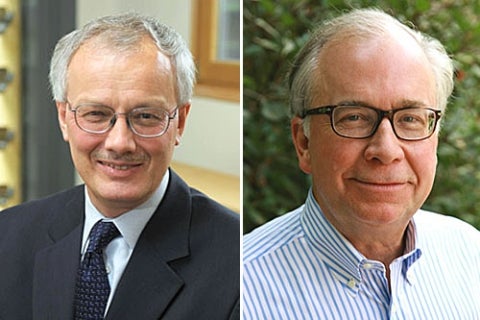Note: Yale School of the Environment (YSE) was formerly known as the Yale School of Forestry & Environmental Studies (F&ES). News articles and events posted prior to July 1, 2020 refer to the School's name at that time.
 Dean Peter Crane, left, and Christopher Glenn Sawyer
Dean Peter Crane, left, and Christopher Glenn Sawyer
One course — “Structuring Success: Skills and People Required to Convert Social Ideas into Positive Community Reality” — will be co-taught by the Dean with Christopher Glenn Sawyer ’75 M.Div., an attorney who has served on the boards of many nonprofits including as the former national chair of the Board for the Trust for Public Land and as chair of the Yale Divinity School’s Board of Advisors. He is also a member of the F&ES Leadership Council. Each week, students will also hear from lead board members from some of the nation’s most influential boards, including The Trust for Public Land, the Land Trust Alliance, The Nature Conservancy, Tom Steyer’s Enterprises, and the Turner Foundation.
The lecture portion of the course will be live streamed at 5:30 p.m. EDT each Wednesday.
Course Schedule
Structuring Success
Wednesdays, 5:30 – 7:30 p.m., Burke Auditorium (Meets Aug. 27 – Nov. 19)
Environmental Leadership and Biography
Thursdays, 5:30 – 7:30 p.m., Burke Auditorium
“Both of these classes speak to the question of leadership, effectiveness, and impact,” said Crane. “They recognize that students will need not only technical expertise when they leave this School, but they will also need other skills and qualities in order to be really successful and to fulfill their roles as environmental leaders.”
The “Structuring Success” course will focus on the process of building a board of advisors and the core skills necessary to grow a successful organization. During each class, students will explore case studies of social organizations that have achieved successes as well as consider such topics as testing an idea for advancement and investment, articulation of a mission, development of strategic and business plans, fund-raising, and board development.
‘Exceptional Board’: Guest Lecturers
September 3
Sarah Charlop-Powers, Vice President, Natural Areas Conservancy.
Max Joel, Program Manager, NYS Energy Research & Development Authority.
September 10
Wendy Paulson, Chair, Bobolink Foundation; Life Trustee and former Chair, The Nature Conservancy (Illinois Chapter)
Roy Richards, Chairman of Southwire Company, one of North America's largest private companies.
September 24
Ted White, Board Member, Rocky Mountain Institute; Managing Partner of Tom Steyer's National Clean Energy Initiatives.
October 1
Fred Rich, Board Chair, Scenic Hudson Land Trust, Foundation for Landscape Studies; Vice Chair, Battery Conservancy; Board Member, Land Trust Alliance.
October 8
Bryan Garcia, CEO, Clean Energy Finance and Investment Authority.
October 15
Ann Colley, Dir. of Public Relations and Charitable Giving, Moore Capital Management; Executive Director & VP, The Moore Charitable Foundation.
Eugenie Gentry, Associate Vice President for Development, Yale University.
Laura Turner Seydel, National environmental advocate and eco-living expert; Chair, Captain Planet Foundation and Zero Waste Zones.
October 29
Rebecca Wesson Darwin, President and CEO, Garden & Gun; former publisher of The New Yorker.
Vincent Stanley, Director, Patagonia Philosophy; Co-author of The Responsible Company.
November 5
John C. Sawyer, Attorney specializing in wealth planning, asset protection planning, fiduciary and tax litigation, conservation easements, and exempt organizations.
Jerry Tone, Chair, Executive Committee, Trust for Public Land.
November 12
Page Knudsen Cowles, National Board Chair of the Trust for Public Land.
Caroline Niemczyk, Chair, The Conservation Campaign; Vice Chair, Open Space Institute; Board member, The Trust for Public Land.
Through the experienced lens of these visitors, this class will also focus on those core non-mission skills that any organization must have to be successful. “Our Schools do a wonderful job of teaching mission related skills, but in order to translate this knowledge into societal gain other skills become just as important,” he said.
Sawyer notes that these skills are critical not just to leadership in the environmental sector, but also in such fields as health, education, and faith. If not introduced in the classroom, he said, the necessary default is to learn them on the job, and that can take a long time and is often not successful for the individual or the entity. “Our society simply has too many challenges; we must expose our rising leaders to the core range of skills that they will need to contribute fully, whether as new employees or as new environmental entrepreneurs. Our society needs this, and them.”
The “Environmental Leadership” course will likewise highlight the careers of contemporary environmental leaders. But a theme running through the course will be the examination of revered and impactful leaders — including John Muir, Rachel Carson, and Gifford Pinchot, the nation’s first Forest Service chief and co-founder of F&ES — as revealed by their biographers.
The class will also include a panel on Women in Environmental Leadership moderated by Margaret Marshall, a Senior Fellow of the Yale Corporation and former Chief Justice of the Supreme Judicial Court of Massachusetts.
Both courses are offered late in the day to minimize schedule conflicts with other classes. Both also have the option to be taken for a single credit.
“Our goal is to engage as many students as possible in these classes, not only from F&ES but also from other units on campus,” said Dean Crane. “The exceptional depth of experience among the speakers in both classes, make this a unique opportunity to learn what it takes for both individuals and organizations to truly make a difference in advancing social change.”